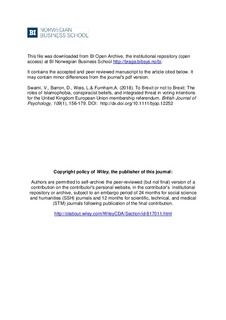To Brexit or not to Brexit: The roles of Islamophobia, conspiracist beliefs, and integrated threat in voting intentions for the United Kingdom European Union membership referendum
Journal article, Peer reviewed
Accepted version
Date
2018Metadata
Show full item recordCollections
- Publikasjoner fra CRIStin - BI [1015]
- Scientific articles [2173]
Abstract
We used an identities approach to examine voting intentions in the June 2016 UK referendum on membership of the European Union ( EU). In April 2016, 303 British adults (58.7% women, age M = 34.73) indicated their voting intentions for the referendum and completed measures of identification with the national in-group, perceived threat from Muslim immigrants, belief in Islamophobic conspiracy narratives, Islamophobia, general conspiracist beliefs, ambiguity tolerance, and belief in a clash of civilizations. Path and mediation analyses indicated that greater belief in Islamophobic conspiracy theories mediated the link between Islamophobia and intention to vote to leave. Islamophobia and Islamophobic conspiracist beliefs also mediated the effects of perceived threat from Muslims on voting intentions. Other variables acted as antecedents of perceived threat or Islamophobic conspiracy narratives. These findings highlight the role that identity-based cognitions may have played in shaping voting intentions for the UK EU referendum.
